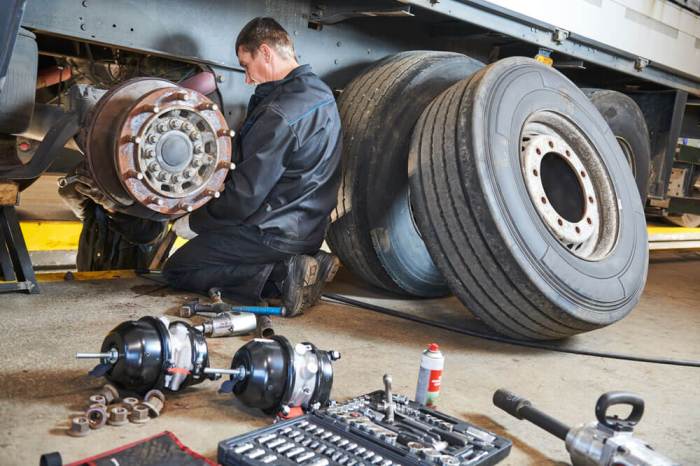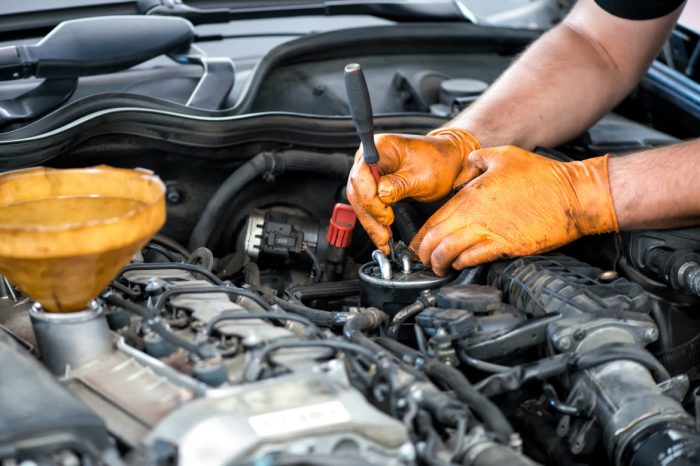Truck maintenance is the key to a smooth ride – from avoiding breakdowns to saving money. Buckle up as we dive into the world of truck maintenance with a high school hip vibe that’ll rev up your knowledge!
Importance of Regular Truck Maintenance
Regular truck maintenance is crucial to ensure the safety of both the driver and other road users. Neglecting maintenance can lead to serious consequences that not only impact safety but also result in costly repairs and downtime.
Prevention of Breakdowns
Regular maintenance helps prevent unexpected breakdowns on the road, which can result in delays, missed deadlines, and additional expenses for towing and repairs. By keeping up with maintenance schedules, truck owners can identify and address potential issues before they escalate into major problems.
Safety on the Road
Well-maintained trucks are safer to operate, reducing the risk of accidents due to mechanical failures. Properly maintained brakes, tires, lights, and other essential components ensure that the truck operates smoothly and responds effectively in emergency situations. This not only protects the driver and passengers but also other motorists sharing the road.
Cost-Effectiveness, Truck maintenance
Investing in regular maintenance may seem like an additional expense, but it ultimately saves money in the long run. By addressing minor issues early on, truck owners can avoid costly repairs that result from neglect. Additionally, a well-maintained truck tends to have better fuel efficiency, prolonging the lifespan of key components and reducing overall operating costs.
Common Truck Maintenance Procedures
Routine maintenance tasks are essential to keep your truck running smoothly and prevent breakdowns on the road. This includes regular oil changes, filter replacements, and tire checks to ensure optimal performance and safety.
Checking Fluid Levels and the Cooling System
It is crucial to regularly inspect fluid levels such as oil, coolant, brake fluid, and transmission fluid. Low levels can lead to engine damage and other issues. Additionally, maintaining the cooling system is vital to prevent overheating, which can cause serious damage to the engine.
- Regularly check and top up fluid levels to prevent damage to the engine.
- Inspect the cooling system for leaks, proper coolant levels, and any signs of damage.
- Flush and replace coolant according to the manufacturer’s recommendations.
Inspecting Brakes, Lights, and Electrical Systems
Properly functioning brakes, lights, and electrical systems are crucial for safe driving and compliance with regulations. Regular inspections can help identify issues early and prevent accidents on the road.
- Check brake pads, rotors, and brake fluid regularly to ensure optimal braking performance.
- Inspect all lights, including headlights, brake lights, turn signals, and hazard lights, to ensure they are working correctly.
- Test the battery, alternator, and electrical connections to prevent starting issues and electrical failures.
Signs of Truck Maintenance Issues

When it comes to keeping your truck in top shape, it’s crucial to be aware of the signs that indicate potential maintenance issues. By recognizing these signs early on, drivers can prevent more serious problems down the road.
Unusual Sounds
- One common sign that your truck may need maintenance is the presence of unusual sounds. These can include squealing brakes, grinding noises when shifting gears, or a rattling exhaust system. If you hear any of these sounds, it’s important to get your truck checked out by a professional mechanic.
Strange Smells
- If you notice strange smells coming from your truck, such as a burning odor, a sweet smell like syrup, or a strong gasoline smell, this could indicate a maintenance issue. These smells may be a sign of overheating, a coolant leak, or a problem with the fuel system. It’s essential to address these smells promptly to avoid potential damage to your truck.
Dashboard Warning Lights
- Dashboard warning lights are designed to alert drivers to potential issues with their vehicles. Common warning lights that indicate maintenance problems include the check engine light, oil pressure light, and battery warning light. If any of these lights come on while driving, it’s crucial to take your truck to a mechanic as soon as possible to diagnose and fix the issue.
Extending the Lifespan of Trucks through Maintenance

Proper maintenance plays a crucial role in extending the lifespan of trucks. By following preventive maintenance tips and implementing effective maintenance schedules, fleet managers can ensure that their trucks remain in optimal condition for longer periods.
Preventive Maintenance Tips
- Regularly check and change the oil to keep the engine running smoothly and prevent wear and tear.
- Inspect and replace air filters as needed to maintain proper airflow and fuel efficiency.
- Monitor tire pressure and tread wear to improve fuel economy and ensure safe driving conditions.
- Check brake systems regularly to avoid costly repairs and ensure safety on the road.
Effective Maintenance Schedules
- Develop a detailed maintenance checklist for each vehicle in the fleet to stay organized and on top of necessary tasks.
- Utilize software or apps to track maintenance schedules and receive reminders for upcoming service appointments.
- Implement regular inspections by trained mechanics to identify potential issues early and address them promptly.
- Establish clear communication channels between drivers, mechanics, and fleet managers to ensure all maintenance tasks are completed on time.